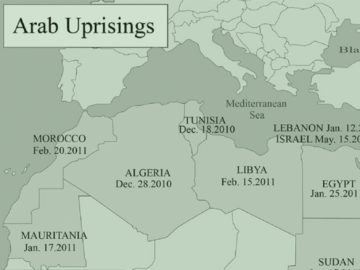Robert Solé in The Markaz Review:
 It is in the middle of winter that the “Arab Spring” comes unexpectedly. On December 17, 2010, in Sidi Bouzid, an agricultural village in central Tunisia, Mohamed Bouazizi, a young unemployed peddler, sets himself on fire after his merchandise is confiscated by police officers. The day after the tragedy, the anger spreads to other cities in the country. President Zine el-Abidine Ben Ali, who has been in power for twenty-three years, denounces “terrorist acts” perpetrated by “hooded thugs.” The deaths will soon be counted by the dozens during clashes with the forces of law and order. “Irhal!” (“leave”) becomes the revolution’s byword. Ben Ali is accused not only of having established a police regime, but also of pillaging Tunisia. On January 14, 2011, overwhelmed by the events, he flees with his family to Saudi Arabia.
It is in the middle of winter that the “Arab Spring” comes unexpectedly. On December 17, 2010, in Sidi Bouzid, an agricultural village in central Tunisia, Mohamed Bouazizi, a young unemployed peddler, sets himself on fire after his merchandise is confiscated by police officers. The day after the tragedy, the anger spreads to other cities in the country. President Zine el-Abidine Ben Ali, who has been in power for twenty-three years, denounces “terrorist acts” perpetrated by “hooded thugs.” The deaths will soon be counted by the dozens during clashes with the forces of law and order. “Irhal!” (“leave”) becomes the revolution’s byword. Ben Ali is accused not only of having established a police regime, but also of pillaging Tunisia. On January 14, 2011, overwhelmed by the events, he flees with his family to Saudi Arabia.
Five days later, as protests erupted in Jordan, Yemen and Lebanon, and firebombings were reported in Algeria, Egypt and Mauritania, an Arab League summit was convened in Sharm el-Sheikh, South Sinai. For once, its secretary general, Amr Moussa abandons the language of wood. “Arab citizens,” he declares, “are in a state of unprecedented anger and frustration.”
More here.
